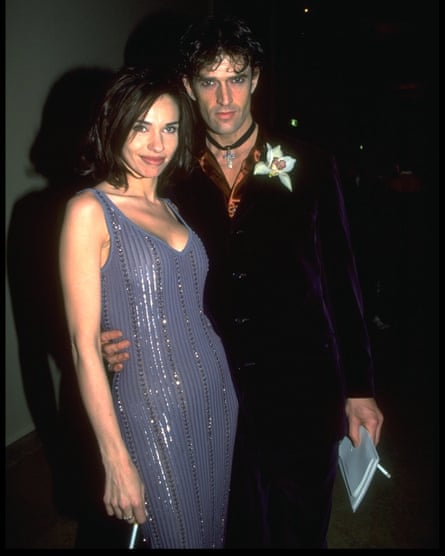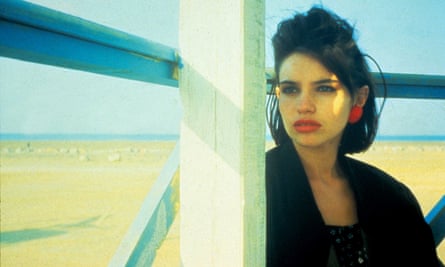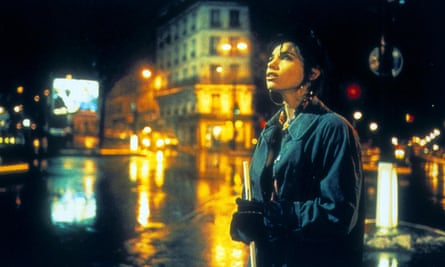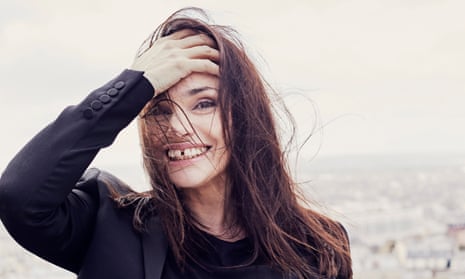Can it really be true, I ask Béatrice Dalle, that you seduced the English actor Rupert Everett? “Bah ouais,” she replies as we chat in a cafe near her apartment in Paris’s third arrondissement. “Rupert is gay, but I am ...” she pauses for effect… “Béatrice Dalle. I’ve never thought I’m beautiful, but I have a power of attraction.”
Gap-toothed, black-clad, red-lipped, brown-eyed, a tattoo of a cross on her left wrist and crucifixes dangling above her cleavage, she has something, all right. The woman whom Everett described once as “Joan of Arc – the suicide-bomber version” throws back her head and unleashes the first of the interview’s many beguilingly dirty laughs. If cackling were an Olympic sport, she would win gold for France.
Dalle, 53, agreed to be interviewed to support her former lover’s directorial debut, The Happy Prince, in which Everett stars as Oscar Wilde during the Irish writer’s last days in Paris and Dalle plays the patronne of a cafe he frequents.
In his 2006 memoir, Red Carpets and Other Banana Skins, Everett described their affair: “I was gay but incompatibility is the agonising driving force behind many dangerous liaisons.” At the time, Dalle had just become internationally famous as the femme fatale Betty Blue in Jean-Jacques Beineix’s 1986 film of the same name, and Everett was in Paris, licking his wounds after the twin flops of his singing career and his performance opposite Bob Dylan in the peculiar film Hearts of Fire.
“I knew I would never find another girl as good as Béa,” he recalled. “She was perfect. When she was with you, she was with you. She had faith and you could do no wrong; until ... that attention would be switched off, like an electric light. It had happened to her husband. It would happen to me. No one left Béa.”
Is that fair, I ask Dalle? “Well, it’s true most of my liaisons have been dangerous.” Her first husband, the painter Jean-François Dalle, killed himself three months after their break-up. She met her second husband, Guénaël Meziani, when filming a movie in the prison where he was serving time for rape; she divorced him in 2014 when he became violent again. In between, she had a tempestuous relationship with the rapper Joey Starr, a man with a fuse so short he once punched a monkey on a TV show.

Dalle has always guarded her independence though. “I’ve never lived with a guy I’ve married or loved. I live on my own. And I’m very good on my own. You see, I want to do all that a man can do, but” – she leans forward, her voice going down an octave – “much better.” Another laugh.
That said, she has always remained friends with her exes. “Why not? They don’t become arseholes just because we stop seeing each other, you know? I’m loyal to those I love.” Is Everett still a friend? “Rupert is more than that. He’s in my heart until the day I die.” Why? “He’s intelligent, he respects people.”
Plus, I suggest, he has something that can still make her come over all unnecessary – an English accent. “It’s true. I love Sid Vicious and I love Prince Charles.” I understand the former, but the latter? “Ever since I was a little girl I loved him and detested Princess Diana. You could be a beggar in the street and, with an English accent, you would be very chic.” She tells me she became besotted for that reason with the Clash’s late frontman Joe Strummer, whom she met while filming Jim Jarmusch’s Night on Earth. “Write this down,” she tells me. “I love you Gary Oldman! I love you Johnny Rotten!”
Dalle is like an amiably gobby mate with an appealingly foul mouth. That said, few of my friends admit to having eaten the ear of a cadaver while on acid and working in a morgue (“It was no big deal,” she told a French TV interviewer a couple of years ago. “In any case, the guy couldn’t complain, he didn’t know I’d eaten his ear.”) And none have convictions for shoplifting or heroin and cocaine possession, events that all figure in Dalle’s biography and some of which were dramatised in Claude Lelouch’s film La Belle Histoire, in which she starred in 1992. “I am a woman of extremes. I’m a punk to death – Sid Vicious is in my soul, but at the same time I love the dandy. Rupert is super dandy, a guy who dresses beautifully.”
Marvellous, but I wish Everett had cast her against type as Wilde’s long-suffering wife, Constance, whose task in the film is to look after the kids in London while her penniless vagabond husband goes into a death spiral of sex and absinthe across the channel. The world has seen Dalle as a bombshell who gets murdered by Jean-Hugues Anglade’s character in Betty Blue, a sexy vampire in Claire Denis’s Trouble Every Day who gets murdered by Vincent Gallo (there’s a theme emerging here), and even a volatile alcoholic mathematician in Patric Chiha’s Domaine. But she has never played a mother and long-suffering wife, as Emily Watson does in The Happy Prince. “Oh, I couldn’t play that role,” she says. Admittedly, it would stretch credulity. She once told Marie Claire magazine: “I’d rather have a Bounty than a baby.” Motherhood is one of the few things not on her CV.
Béatrice Françoise Odona Cabarrou left her mum and dad in Le Mans aged 14. “I went to a Dead Kennedys gig and, once I’d seen Jello Biafra, I knew I was not going home.” Although Dalle claims her English is lamentable, she proves word perfect when we duet on a chorus of California Über Alles. She headed for Paris, where she became part of an indie rock subculture, living off shoplifting and falling for Jean-François Dalle, whose surname she adopted.
“I’m much more interested in the world of rock than that of music,” she says now. What’s on your iPhone? “Rage Against the Machine, Dead Kennedys. Me, I like hardcore. After punk, I love rap. One of my exes is a rapper. You know what’s really respectable with rap? It’s like punk. Maybe you don’t like the music or whatever, but it’s a cry, a cry from the street.”
One day in the mid-80s, Dalle was walking around Paris and got snapped by a passing photographer. “The next thing I know I’m on the cover of a magazine called Photo.” The image was seen by the casting director Dominique Besnehard, who proposed her for the lead in Betty Blue.

“When I went for auditions there were many superb actresses there, well known, magnificent, but I was better.” She declines to name them. “They had good reason to cast me, because the film was a big success and even now in foreign countries I’m known not as Béatrice Dalle but as Betty.” What does she think of Betty Blue now? “I haven’t seen it for ages.” I tell her that I thought it was sexist. A chill passes through the upstairs room of Le Progrès cafe. “That idea has never crossed my mind ever,” she says. “Why sexist?” Well, it’s not so much the lingering shots of Dalle in the nude as the storyline. Betty is, we are to believe, an untameable spirit until she discovers her lover Zorg’s notebooks in a box, decides he is a literary genius and turns typist (why can’t he type his own bloody manuscript?), before becoming so unhinged that she puts out her own eye and he feels obliged (spoiler alert) to suffocate her with a hospital pillow. Surely that’s sexist? “Me, I couldn’t care less about what you’re saying,” she says, not unpleasantly.
Rather, she is proud of being Betty: “There are lots of English and American rock musicians who’ve done homages to me as Betty. I’m really proud of that.” There’s a woman who calls herself Béatrice Valle. “She asked my permission to change her name to that and make a porn film based on Betty Blue. How could I say no?” Dalle hasn’t seen the results.
Since that debut, Dalle has grown up in public, arguably learning to act in the process. “I’ve done 75 films and they’re all super,” she says. How come? “Because I’ve always worked with auteurs.” Among them are Michael Haneke and Claire Denis. Are you rich? “Hell, no. I don’t have a car, I don’t own my place, I don’t have a house in the country. But when I look at my career, I know I’m a good actress. I won’t prostitute myself. I absolutely do not criticise prostitutes but I’ve never accepted a role for money.”
Have you ever been sexually harassed on set? “Never.” That said, on the DVD of Betty Blue she gives an interview recalling how the director promised discretion when they filmed sex scenes, but in practice there were so many gawping crew members that she felt as though she was in an X-rated movie. “I’ve held a grudge against Beineix for that ever since,” she says.
Dalle, though, doesn’t agree with fellow French actors Catherine Deneuve and Brigitte Bardot about the alleged Anglo-Saxon puritanism behind the #MeToo movement. “In solidarity with women, I support #MeToo and the women who have been maltreated. But you know what I find bizarre? It’s how these men get denounced and then you see all these images of these same women posing arm-in-arm with them. That happened with Harvey Weinstein. There were the actresses who denounced him – very good. But then, what, walking arm-in-arm with him? Really?”
Did you ever meet Weinstein? “Yes, he was super correct with me,” she replies. “He introduced me to Mickey Rourke. I’ve been a big friend of Mickey’s for 30 years now. I was going to marry him at one point. Write this down. I love you, Mickey Rourke!”
Her career might have been different had she not slapped an American embassy official in 1997. “Oh, but he was asking for it!” she says. What happened? “I needed a green card to work with Abel Ferrara [on his film The Blackout]. I’d been convicted recently of possessing heroin and cocaine, and so this consul says: ‘You’re not the kind of person we want in America.’ He spoke to me disrespectfully. I said to him: ‘You don’t speak to your wife like that, so don’t speak to me like that.’ And I slapped him. I was banned for seven years.”
But didn’t it cost her a Hollywood career? “I don’t give a fuck about that. I never wanted a Hollywood career. I was supposed to be in Pulp Fiction and I would have liked to work for Tarantino but I couldn’t make it, and they gave the role [of Fabienne, the girlfriend of Bruce Willis’s Butch] to a Portuguese actress [Maria de Medeiros].

“You see, I have a fantasy about English cinema, but not American.” Her greatest unrealised dream, she tells me, is to work with British auteur Peter Greenaway. “Drowning by Numbers, A Zed & Two Noughts, The Belly of an Architect, Nighwatching – incroyable!”
Her wish to work in English cinema, The Happy Prince notwithstanding, has not materialised. If only, I suggest, Ken Loach could make a second film in his gallic oddball series. After Looking for Eric, Loach must do a biopic called Finding Béatrice. “Eric’s a great friend of mine,” she says of the former footballer. “He is a great guy, because he took a stand against homelessness when he launched his presidential campaign.
“What he said is really important, especially now when you look out the window even here and see whole families on the street. I went on TV to say: ‘Me, I like drugs, rock, sex, I don’t give a damn about the law, but with one exception. There is this law saying minors should not sleep in the street. For once I urge you to respect that law. Do your job politicians and house the children.’”
Four years ago, Dalle made her theatrical debut in Victor Hugo’s Lucrezia Borgia as the daughter of the Renaissance’s most debauched papal family. “Carnivorous, animal, beautiful and monstrous, wounded and gentle, devouring and devoured, welcome to the Lucrezia Borgia of Béatrice Dalle,” began Le Monde’s rave review. Today, she has just finished her well-received Paris collaboration with director Virginie Despentes, in which the pair narrate sections from Italian director Pier Paolo Pasolini’s memoirs. “One of the things I love about appropriating his texts is that I get to read his gay male pornographic fantasies in the voice of a woman.” She currently has plans to turn gender on its head again by playing a male Shakespearean tragic hero. “My future, I think, is on stage.”
It’s nearly time for Dalle to leave. Tell me about your religious faith, I say, nodding at her tattoo. “I was raised a Catholic and still go to church every week. In fact, it’s the one round the corner on the Rue de Turenne. Write this down,” she says. “I love you, Jesus Christ!” For a moment, I don’t understand what she’s saying. “Jesus!” she says incredulously, pointing upwards. “You know, the boss?” Why do you love him? “I love Christ because he invented bondage,” she says, laughing shamelessly. Is that what you tell your priest? She ignores the question and stands up to make her point. “Think of how he hangs on the cross with his hips swung out.” She imitates his pose. “He’s very sexy, no?” A final cackle, a quick selfie, two kisses and she’s gone.
I wander over to her church, the nearby Saint-Denys du Saint-Sacrement, and savour Delacroix’s Pietà in the Chapel of the Virgin. I imagine Dalle sometimes sits there, having a big lubricious laugh. I wouldn’t put it past her.
The Happy Prince is released on 15 June.
